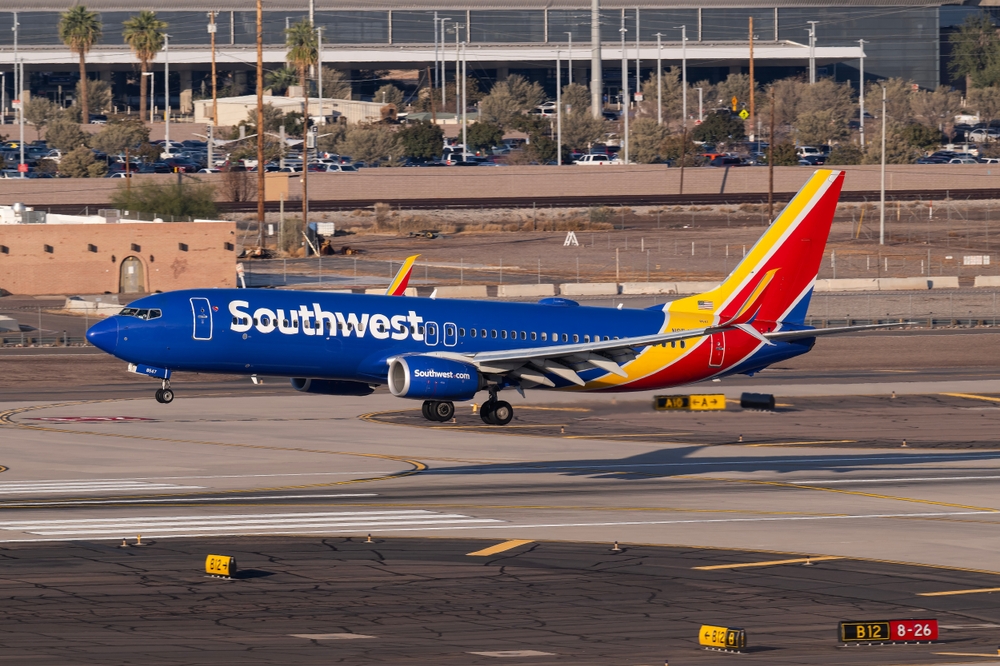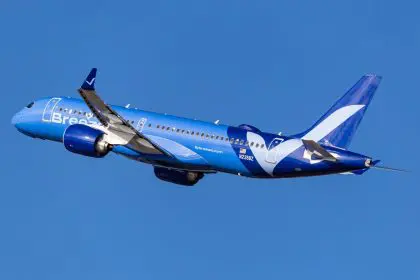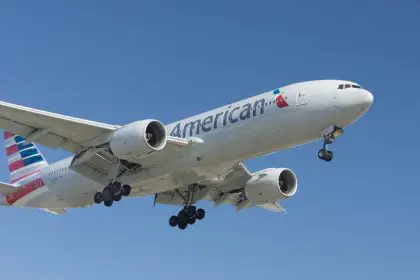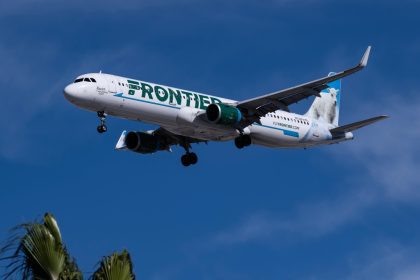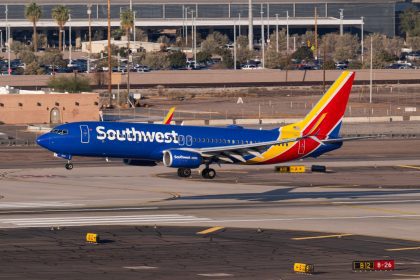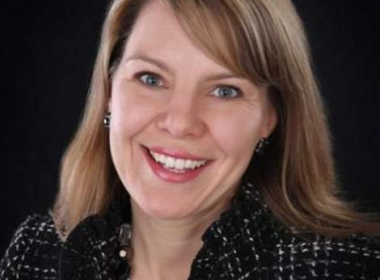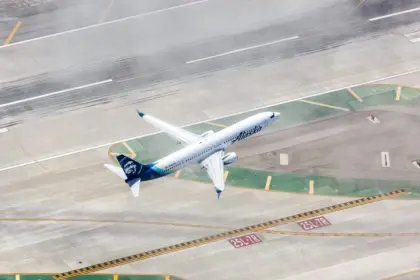Southwest Airlines has abandoned one of its most distinctive customer benefits by eliminating its decades-old policy of providing two free checked bags to passengers. The carrier implemented new baggage fees beginning May 29, 2025, marking a historic departure from the generous approach that helped differentiate it from major competitors throughout its operational history.
The policy change affects millions of travelers who have long relied on Southwest’s baggage benefits as a key factor in their airline selection decisions. This transformation represents the most significant alteration to the airline’s customer service model since its founding, fundamentally changing the economic equation for passengers who frequently travel with checked luggage.
New fee structure impacts most fare categories
Starting with tickets purchased on or after May 29, passengers flying on Basic, Wanna Get Away Plus, and Anytime fares must pay $35 for their first checked bag and $45 for their second checked bag. These fees apply to standard-sized luggage within weight limitations, bringing Southwest in line with industry practices that have become commonplace among major carriers.
Travelers who purchased tickets before the implementation date continue to receive two free checked bags under the previous policy terms, creating a temporary dual system that recognizes existing booking commitments. This grandfather provision applies regardless of actual travel dates, providing some relief for passengers who made advance reservations expecting traditional Southwest benefits.
The fee structure places Southwest’s charges slightly below some competitors’ rates while eliminating what had been a significant competitive advantage in attracting budget-conscious travelers. Industry analysts note that baggage fees have become substantial revenue sources for airlines, often generating billions in annual income across the sector.
Premium passengers retain traditional benefits
Despite the widespread implementation of baggage fees, Southwest has preserved free checked bag privileges for certain customer categories deemed most valuable to its business model. Business Select ticket holders continue receiving two free checked bags, maintaining the premium positioning of the airline’s highest-priced fare category.
Members of Southwest’s loyalty program retain significant advantages under the new system, with A-List status providing one free checked bag and A-List Preferred status maintaining two free checked bags. These benefits ensure that frequent flyers who generate substantial revenue for the airline continue receiving preferential treatment that acknowledges their loyalty and spending levels.
Customers using Southwest co-branded credit cards also preserve access to free checked baggage benefits, creating incentives for deeper financial relationships with the airline’s banking partners. This approach follows industry patterns of using credit card partnerships to maintain customer loyalty while generating additional revenue streams through financial services relationships.
Corporate pressure drives strategic transformation
The baggage fee implementation represents one component of a broader strategic overhaul influenced by Elliott Investment Management, an activist investor that has pushed Southwest toward more conventional industry practices. This external pressure has accelerated changes that airline executives had previously resisted, fundamentally altering Southwest’s operational philosophy and customer value proposition.
Elliott’s involvement has prompted multiple significant policy changes beyond baggage fees, including the introduction of basic economy fares that further align Southwest with industry standards. The investment firm’s influence extends to long-term strategic planning, with assigned seating scheduled for implementation in 2026 despite decades of Southwest’s commitment to open seating arrangements.
These changes reflect broader industry consolidation around similar service models and pricing structures, reducing the distinctive characteristics that previously set Southwest apart from competitors. The transformation suggests that external financial pressures can override longstanding corporate cultures and customer service philosophies when investor returns become primary considerations.
Revenue optimization drives industry alignment
Southwest’s decision to implement baggage fees follows industry-wide trends toward unbundling services that were previously included in ticket prices. Airlines have discovered that separating formerly complimentary services into fee-based options generates substantial additional revenue while allowing advertised base fares to remain competitive with budget-conscious travelers.
The unbundling strategy enables airlines to capture revenue from passengers who require specific services while maintaining lower advertised prices for travelers who can avoid additional fees. This approach has proven financially successful across the industry, generating billions in annual ancillary revenue that significantly impacts airline profitability and shareholder returns.
Industry data demonstrates that baggage fees consistently rank among the most lucrative ancillary revenue sources, often generating higher profit margins than ticket sales themselves. Southwest’s entry into this market represents a significant potential revenue increase that could substantially impact the airline’s financial performance and competitive positioning within the industry.
Customer adaptation strategies emerge
Travelers are developing various approaches to minimize the impact of Southwest’s new baggage fees, with many reconsidering packing strategies and travel planning methodologies. Experienced flyers are increasingly focusing on carry-on luggage optimization to avoid checked bag charges while maintaining necessary travel items and clothing options.
Some passengers are evaluating whether Southwest’s overall value proposition remains competitive given the elimination of free checked bags, particularly for trips requiring substantial luggage. This reassessment includes comparing total travel costs across airlines rather than focusing primarily on advertised base fares that may not reflect actual expenses after adding necessary services.
Business travelers and frequent flyers are particularly impacted by these changes, as their travel patterns often require checked luggage for extended trips or professional equipment. Many are exploring loyalty program benefits and credit card options that preserve free baggage privileges while others consider switching to airlines that better accommodate their specific travel requirements.
Market positioning and competitive dynamics
Southwest’s policy change eliminates one of its most significant competitive advantages in attracting price-sensitive travelers who prioritize total trip costs over base fare prices. The airline’s previous baggage policy often made it the most economical choice for travelers with checked luggage, even when competitors offered lower advertised fares.
The elimination of this differentiator forces Southwest to compete more directly on factors such as route networks, schedule convenience, and overall service quality rather than relying on unique cost advantages. This shift may benefit competitors who can now compete more effectively with Southwest’s total pricing while potentially disadvantaging travelers who previously benefited from the airline’s generous baggage policies.
Industry observers expect the change to influence market dynamics significantly, as Southwest’s baggage benefits had pressured some competitors to maintain more generous policies or risk losing customers. The removal of this competitive pressure may enable industry-wide fee increases or reduced pressure to offer alternative customer benefits.
Long-term implications for airline industry
Southwest’s adoption of baggage fees represents a significant milestone in the industry’s evolution toward standardized ancillary revenue practices. The change eliminates one of the last major deviations from industry norms among large carriers, suggesting continued consolidation around similar service models and pricing structures.
This transformation may accelerate similar changes at other airlines that had maintained customer-friendly policies as competitive advantages. The success or failure of Southwest’s fee implementation will likely influence strategic decisions across the industry regarding the balance between customer satisfaction and revenue optimization.
The broader implications extend beyond baggage policies to questions about airline differentiation strategies and the sustainability of customer-focused business models in an industry increasingly driven by financial optimization. Southwest’s changes suggest that even airlines with strong cultural commitments to customer service may face pressures that ultimately override traditional operational philosophies.
Southwest Airlines’ decision to end its iconic free checked bags policy marks a watershed moment in commercial aviation, eliminating a customer benefit that had distinguished the carrier for decades while potentially generating hundreds of millions in additional annual revenue through alignment with industry-standard practices.

